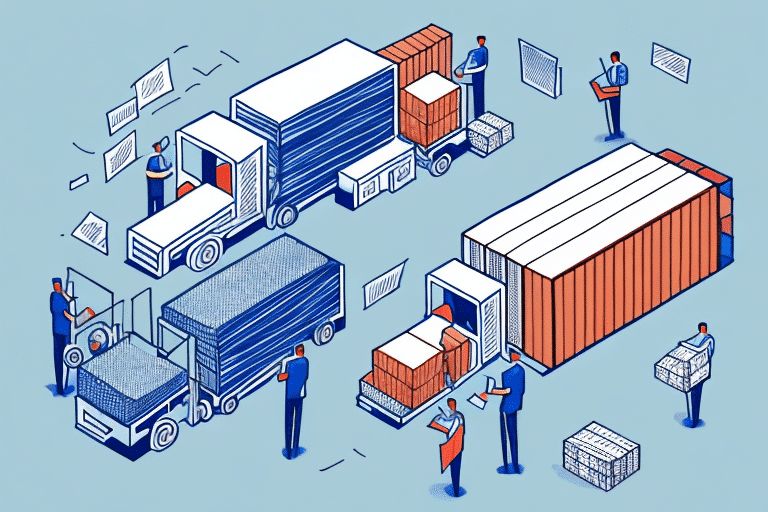Causes of Shipping Delays and How to Identify Them
Shipping delays are influenced by a multitude of factors within the supply chain. Understanding these causes is critical for businesses aiming to enhance their logistics efficiency and ensure timely deliveries.
Planning and Coordination Issues
A primary cause of shipping delays is inadequate planning and coordination among supply chain partners. Inefficient inventory management, scheduling conflicts, and poor coordination between suppliers, carriers, and distributors can create bottlenecks. According to the Supply Chain Digital, effective coordination can reduce delays by up to 30%.
Transportation Problems
Transportation-related issues, such as mechanical failures, driver shortages, and infrastructure limitations, significantly contribute to shipping delays. The Bureau of Transportation Statistics reported a 15% increase in delays caused by transportation disruptions in 2023.
Inventory Management
Inaccurate inventory tracking can lead to stockouts or overstocking, both of which disrupt the shipping process. Implementing advanced inventory management systems can enhance accuracy and reduce related delays.
Communication Breakdowns
Effective communication is essential for smooth shipping operations. Miscommunications between stakeholders can result in missed deadlines and errors in shipment processing. Utilizing collaborative platforms can mitigate these issues.
Types of Shipping Delays
Shipping delays can manifest in various forms, each with distinct causes and implications.
Carrier Delays
Delays caused by carriers may result from overcapacity, operational inefficiencies, or labor strikes. The Federal Railroad Administration highlights that carrier-related delays account for approximately 20% of all shipping disruptions.
Transit Delays
Transit delays often arise from adverse weather conditions, accidents, or unforeseen events such as natural disasters. For instance, severe storms can halt transportation routes, leading to significant delays.
Customs Clearance Delays
International shipments frequently encounter delays at customs due to incomplete documentation or compliance issues. Ensuring thorough and accurate paperwork can expedite the clearance process. The U.S. Customs and Border Protection emphasizes the importance of compliance in reducing these delays.
Inventory Delays
When products are out of stock or unavailable for shipment, inventory delays occur. This can result from production setbacks, unexpected demand surges, or supply chain disruptions. Maintaining real-time inventory visibility is crucial for mitigating these delays.
Communication Delays
Breakdowns in communication between shipping companies, customers, and other involved parties can lead to confusion and missed deadlines, ultimately causing delays in product delivery.
Impact of Shipping Delays on Businesses and Consumers
Shipping delays can have profound consequences for both businesses and consumers, affecting revenue, customer satisfaction, and brand reputation.
Business Implications
For businesses, delays can result in lost sales, increased operational costs, and diminished customer trust. According to a study by Nielsen, 59% of consumers are less likely to purchase from a retailer that consistently experiences shipping delays.
Consumer Experience
Consumers may face frustration and inconvenience due to delayed deliveries, leading to decreased satisfaction and potential loss of loyalty. Clear communication and proactive updates can help mitigate negative experiences.
Strategies to Mitigate Shipping Delays
Implementing effective strategies can significantly reduce the occurrence and impact of shipping delays.
Invest in Advanced Logistics Technology
Adopting logistics technologies such as real-time tracking, predictive analytics, and automated inventory management can enhance visibility and enable proactive problem-solving. The IBM Supply Chain Insights platform, for example, leverages AI to predict and address potential disruptions before they escalate.
Optimize Inventory Management
Maintaining accurate inventory levels through systems like Just-In-Time (JIT) can prevent stockouts and reduce delays. Implementing automated replenishment processes ensures that inventory aligns with demand forecasts.
Strengthen Relationships with Supply Chain Partners
Building robust relationships with carriers, suppliers, and distributors fosters better communication and collaboration, facilitating quicker resolution of issues that may cause delays.
Develop Contingency Plans
Having backup plans for transportation routes, alternative suppliers, and emergency response procedures ensures that businesses can swiftly adapt to unexpected disruptions.
The Role of Technology in Mitigating Shipping Delays
Technology plays a pivotal role in identifying, preventing, and managing shipping delays.
Real-Time Tracking Systems
Implementing real-time tracking allows businesses and customers to monitor shipments, providing transparency and enabling timely interventions when issues arise.
Predictive Analytics
Predictive analytics can forecast potential delays by analyzing historical data and current trends, allowing businesses to take preemptive actions.
Automation
Automated systems streamline processes such as order processing, inventory management, and documentation, reducing the likelihood of human errors that can lead to delays.
Communication and Customer Management
Effective communication is essential for managing shipping delays and maintaining positive relationships with customers.
Managing Customer Expectations
Providing regular updates on shipment status and expected delivery times helps manage customer expectations and reduce frustration caused by delays.
Handling Customer Complaints
Responding promptly and empathetically to customer complaints, offering solutions such as refunds or expedited shipping, and taking steps to prevent future issues are crucial for maintaining trust.
Forecasting and Contingency Planning
Proactively forecasting potential shipping delays and establishing contingency plans can minimize their impact on business operations.
Analyzing Industry Trends
Monitoring trends such as seasonal demand fluctuations, geopolitical events, and economic indicators helps in anticipating and preparing for potential disruptions.
Developing Backup Strategies
Creating alternative transportation plans, securing multiple suppliers, and maintaining safety stock are effective strategies for handling unexpected delays.
Impact of COVID-19 on Shipping and Future Considerations
The COVID-19 pandemic has reshaped the shipping landscape, introducing new challenges and necessitating adaptive strategies.
Supply Chain Disruptions
The pandemic caused significant disruptions, including container shortages and delays in international shipments. Businesses have adapted by diversifying their supply sources and increasing local inventory.
Emphasis on Sustainability
COVID-19 has heightened the focus on sustainable practices within shipping. Companies are increasingly adopting eco-friendly technologies and optimizing routes to reduce carbon emissions.
Adapting to Changing Consumer Behavior
The surge in e-commerce demand during the pandemic has required businesses to scale their logistics operations, invest in automation, and enhance their online tracking capabilities to meet customer expectations.
The Importance of Contingency Plans for Unexpected Shipping Delays
Having robust contingency plans is vital for mitigating the effects of unforeseen shipping delays and ensuring business continuity.
Establishing Flexible Logistics Networks
Creating a flexible logistics network with multiple transportation options and suppliers allows businesses to quickly switch strategies in response to disruptions.
Implementing Emergency Protocols
Developing clear emergency protocols ensures that all stakeholders know how to respond during a delay, facilitating swift and coordinated actions to resolve issues.
Regularly Updating Plans
Contingency plans should be regularly reviewed and updated to reflect the latest industry trends, technological advancements, and potential risk factors.
In conclusion, shipping delays pose significant challenges to both businesses and consumers. By understanding their causes, leveraging technology, enhancing communication, and developing comprehensive contingency plans, businesses can effectively mitigate the impact of these delays, ensuring smoother operations and sustained customer satisfaction.




















